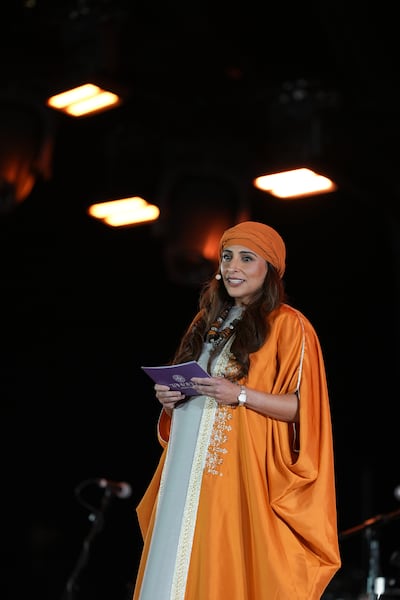When was the last time you went to a music festival where the artists were support acts to the venue? It’s a question that comes to mind when attending Friday's opening night of Sharjah’s Tanweer Festival. Running until Sunday, the inaugural event is held under the stars of the stunning orange desert landscape of Mleiha.
Located within an outdoor purpose-built venue near the Mleiha Archaeological Centre, the stunning site resembles an arty village, complete with communal bonfires, an Emirati heritage village, an arts and wellness market, and a dome-shaped indoor space for yoga sessions.
Founded and curated by Sheikha Bodour Al Qasimi, Tanweer Festival – from its location to timing – is partly meant to offer a sense of reflection and an opportunity to connect with forms of music grounded in the spirituality and heritage of the Middle East and North Africa.
“The idea for Tanweer Festival first emerged from a desire to create an event that could truly celebrate the convergence of art, culture and community in a meaningful way. My inspiration stemmed from Sharjah’s deep-rooted cultural history and its ongoing commitment to supporting the arts as a catalyst for positive change,” she tells The National.
“I envisioned a space where people from different backgrounds could come together to experience creativity in its purest form, building bridges across cultures through shared artistic expressions.”

Reaching that goal requires a festival site that is easy to navigate and clear in its vision. A main walkway, lined by small white stones, courses through the middle of the space, flanked by an outdoor dining hall with food trucks and the heritage village.
And like any village, the residents are responsible for its hospitality and vibrancy. On that note, it was a hit courtesy of the “golden girls” of the Sharjah Institute for Heritage. For nearly two decades, the elderly collective of a dozen Emirati women have clocked up more air miles than the most seasoned artists on the festival bill and, once again, they welcomed visitors in their tent and showcased some of the nuanced embroidery and perfume-making techniques defining Emirati arts and crafts.
Nearby another irrepressible elderly man, simply called “uncle” manned a coffee stand. The strength of his brew matched the clarity of his memory of an emerging Sharjah of the 1960s. “Patience is the key,” he says. “Craftsmanship, whether it’s making a good coffee or building a community, takes time and deep understanding.”
For those looking to glean some of those internal insights, the yoga pavilion is the place to go. Luring the crowd through the infrared light from within, it’s a lavish and serene space filled with more than 100 yoga mats set up for scheduled group sessions. For those not inclined to join, you can simply walk in, take your shoes off and luxuriate in the temperate coolness and spa-like vibes.

The opening night’s headliner, Sami Yusuf, also benefited from the festival’s approach. For years, the award-winning British composer and instrumentalist rarely performed at a UAE event matching the grandiosity and theme that aligned with the tenor of his trailblazing work.
While his Expo 2020 Dubai show came close to channelling the vibrant multiculturalism of his songs, it was at this festival he finally found an event that echoes the nature of his music, which is grounded in Islamic spirituality and heritage.
Performing on the main stage, an outdoor amphitheatre at the foot of one of Mleiha’s mountains, Yusuf and his large ensemble delivered a formidable set, underscoring his pedigree as a masterful arranger and interpreter of sacred Islamic songs and poetry. The power of these songs was accentuated further by various images of Islamic motifs and geometric patterns projected onto the mountains above the stage.

Yusuf acknowledged the space after the contemplative and largely instrumental opening number Ven Mi Alma, with its mystical-sounding balaban (double-reed wind instrument) and the yearning notes of the kamancheh, a bowed-string instrument used in Azerbaijani and Uzbek music.
"I want you to know that tonight's concert is a deeply personal offering for me," he noted, before adding that the reason for this rare live performance was the festival's mission to "create spaces for reflection, unity and illumination".
The rest of the nearly 90-minute set perfectly rendered that experience, from the achingly beautiful En al-Andalus (Jadaka al-Ghaith), with its interpolation of a 14th-century poem by the Arab Andalusian polymath Ibn Al Khatib, to Ilahana, which has its strident spiritual chants and lyrics attributed to the eighth-century poet Abu Nawas. The latter also resonated through the sparse instrumentation and steady polyrhythmic hand claps.
It was a captivating performance, greeted by the kind of crowd response a festival like Tanweer would hope for: gripping silence born of being present in the moment. Sheikha Bodour alluded to this when defining what constitutes success for this labour of love.
“I am interested in the quality and depth of the connections formed, the inspiration that sparks new ideas, and the sense of personal and communal transformation that attendees experience,” she says. “I want people to ultimately leave with a renewed sense of hope, purpose, and a greater appreciation for the beauty of human connection and cultural diversity.”
In what has been a difficult year for the region, the Tanweer Festival is a welcome surprise.
Tanweer Festival runs until Sunday in Mleiha, Sharjah. Tickets start at Dh700. It runs from 6.15pm to 11.30pm


